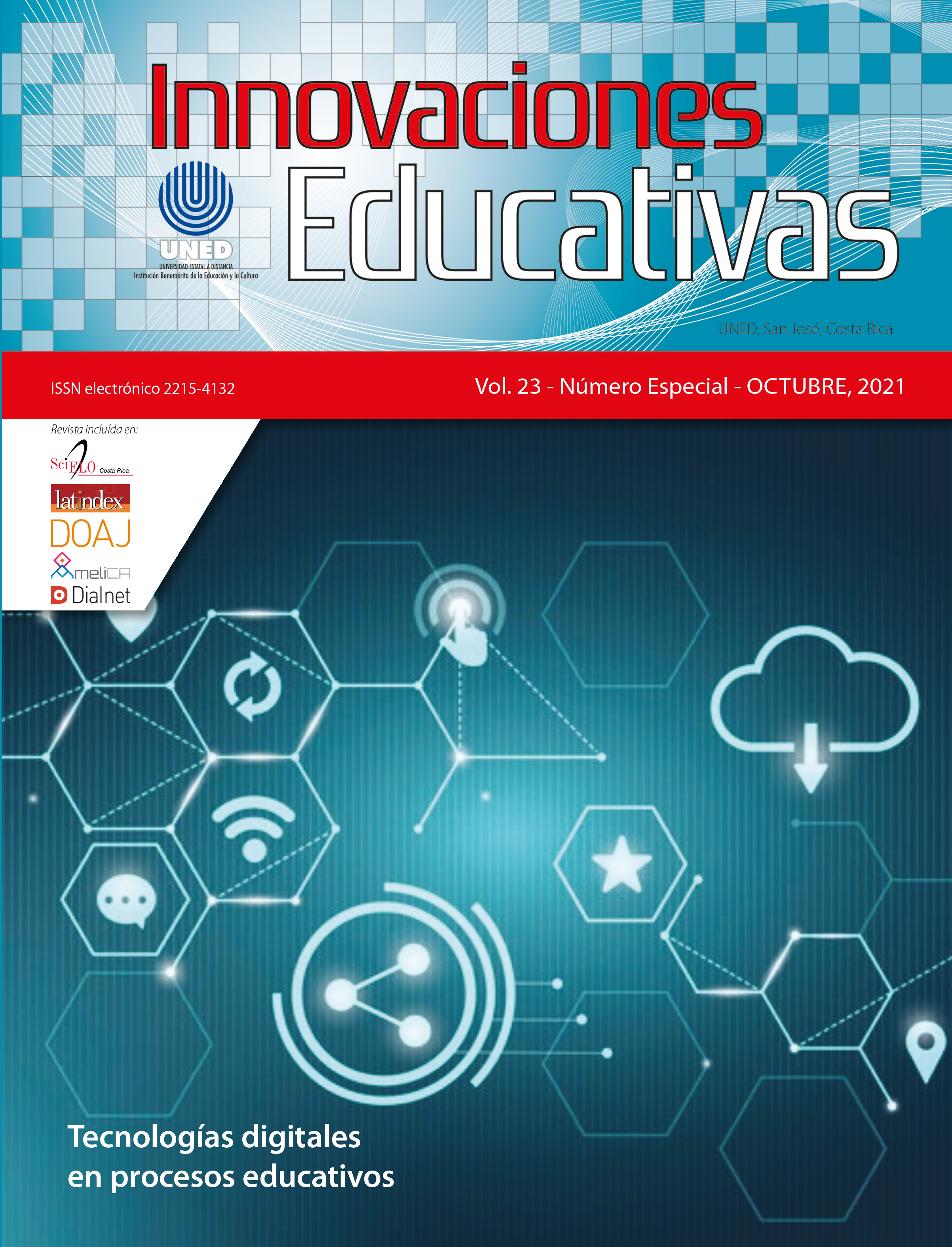Computational thinking: associated skills and teaching resources
DOI:
https://doi.org/10.22458/ie.v23iEspecial.3693Keywords:
Education, skills, digital literacy, robotics, programming languageAbstract
Today's society requires that future citizens be prepared in digital skills. Precisely, computational thinking could be one of the ways to promote this new literacy. In this sense, the objective of this article is to analyze empirical studies regarding associated skills and didactic resources for the development of computational thinking. An exhaustive search was carried out in two databases: EBSCO and SCOPUS between the years 2017 and the first semester of 2021, obtaining 15 articles for the review. According to the analysis of the collected evidence, it was identified that the most recurrent skills are: computational concepts and practices and pedagogical perspectives. In addition to the abstraction, pattern recognition, decomposition and algorithm associated with problem solving. Robotics and the programming language are the most frequently used resources in pedagogical experiences. Being regular basic education, with 60%, the most studied level. Therefore, computational thinking is feasible to be brought into the classroom from an early age, but it is necessary for teachers to know the different strategies and languages in order for students to acquire the skills of the 21st century.
References
Adell, J., Llopis, M., Esteve, M. y Valdeolivas, N. (2019). El debate sobre el pensamiento computacional
en educación. RIED. Revista Iberoamericana de Educación a Distancia, 22(1), 171-186. DOI: http://
dx.doi.org/10.5944/ried.22.1.22303
Arencibia, Y., Cawanga, I., Deco, C., Bender, C., Avello-Martínez, R. y Villalba-Condori, K. (2020).
Developing computational thinking with a module of solved problems. Computer Applications in
Engineering Education, 29(3), 506-516. DOI: 10.1002/cae.22214
Ayuso, Á., Povedano, N. y López, R. (2020). Problem solving with Polya's technique using computational
thinking and Scratch with secondary school students. Aula Abierta, 49(1), 83-90. DOI: 10.17811/
RIFIE.49.1.2020.9-16
Balladares, J., Avilés, M. y Pérez, H. (2016). Del pensamiento complejo al pensamiento computacional:
retos para la educación contemporánea. Sophia, colección de Filosofía de la Educación, 21(1), 143-
DOI: 10.17163/soph.n21.2016.06
Bocconi, S., Chioccariello, A., Dettori, G., Ferrari, A. y Engelhardt, K. (2016). Developing computational
thinking in compulsory education - Implications for policy and practice. EUR 28295.
DOI:10.2791/792158
Bordignon, F. e Iglesias, A. (2020). Introducción al pensamiento computacional. 1a edición para el profesor.
http://biblioteca.clacso.edu.ar/Argentina/unipe/20200414101408/introduccion-pensamiento-
computacional.pdf
Brennan, K. y Resnick, M. (2012). Using artifact-based interviews to study the development of computational
thinking in interactive media design. Paper presented at annual American Educational
Research Association meeting, Vancouver, BC, Canada. https://web.media.mit.edu/~kbrennan/
files/Brennan_Resnick_AERA2012_CT.pdf
Caballero-González, Y. y García-Valcárcel, A. (2020). Learning with robotics in primary education? A
means of stimulating computational thinking. Education in the Knowledge Society, 20(10), 1-15.
DOI: 10.14201/eks.21443
Caballero-González, Y. y Muñoz-Repiso, A. (2020). Fortaleciendo el pensamiento computacional y
habilidades sociales mediante actividades de aprendizaje con robótica educativa en niveles escolares
iniciales. Pixel-Bit, Revista de Medios y Educación, 58, 117-142. DOI: 10.12795/pixelbit.75059
Cachero, C., Barra, P., Melia, S. y López, O. (2020). Impact of programming exposure on the development
of computational thinking capabilities: An empirical study. IEEE Access, 8, art. no. 9063433,
-72325. DOI:10.1109/ACCESS.2020.2987254
Cervera, N., Diago, P., Orcos, L. y Yáñez, D. (2020). The acquisition of computational thinking through
mentoring: An exploratory study. Education Sciences, 10(8), art. no. 202. https://doi.org/10.3390/
educsci10080202
Chiazzese, G., Fulantelli, G., Pipitone, V. y Taibi, D. (2018). Engaging primary school children in computational
thinking: Designing and developing videogames. Education in the Knowledge Society, 19
(2), 63-81. DOI: 10.14201/EKS20181926381
Esteve-Mon, F., Adell-Segura, J., Nebot, M., Novella, G. y Aparicio, J. (2020). The development of computational
thinking in student teachers through an intervention with educational robotics. Journal
of Information Technology Education: Innovations in Practice, 18, 139-152. DOI: 10.28945/4442
Fernández, J., Zúñiga, M., Rosas, M. y Guerrero, R. (2018) Experiences in Learning Problem-Solving
through Computational Thinking. Journal of Computer Science and Technology (JCS&T). Vol. 18,
Issue 2, 136-142. DOI: 10.24215/16666038.18.e15.
García, J. (2020). La expansión del pensamiento computacional en Uruguay. Revista de Educación a
Distancia (RED), 20(63). https://doi.org/10.6018/red.410441
González-González, C., Holz, V., Moro, A., García, L. y Franco, M. (2021). Educational robotics in inclusive
contexts: The case of the hospital Classrooms. Educación XX1, 24(1), 375-403. DOI: 10.5944/
educXX1.27047
Maraza-Quispe, B., Sotelo-Jump, A., Alejandro-Oviedo, O., Quispe-Flores, L., Cari-Mogrovejo, L.,
Fernández-Gambarini, W. y Cuadros-Paz, L. (2021). Towards the development of computational
thinking and mathematical logic through scratch. International Journal of Advanced Computer
Science and Applications, 12(2), 332-338. DOI: 10.14569/IJACSA.2021.0120242
Pérez, M. (2017). El pensamiento computacional para potenciar el desarrollo de habilidades relacionadas
con la resolución creativa de problemas. 3C TIC. mar-jun 2017, Vol. 6. 38-63. DOI:
17993/3ctic.2017.55.38-63
Polanco, N., Ferrer, S., y Fernández, M. (2021). Aproximación a una definición de pensamiento computacional.
RIED. Revista Iberoamericana de Educación a Distancia, 24(1), 55-76. doi: http://dx.doi.
org/10.5944/ried.24.1.27419
Rico, M. y Basogain-Olabe, X. (2018). Pensamiento computacional: rompiendo brechas digitales y educativas.
EDMETIC, 7(1), 26-42. https://doi.org/10.21071/edmetic.v7i1.10039
Román, M. (2016). Codigoalfabetización y pensamiento computacional en educación primaria y secundaria:
validación de un instrumento y evaluación de programas. [tesis doctoral]. Universidad Nacional de
Educación a Distancia (España). http://e-spacio.uned.es/fez/view/tesisuned:Educacion-Mroman
Roncoroni, U., Lavín, E. y Bailón, J. (2020). Pensamiento computacional. Alfabetización digital sin computadoras.
Icono 14, 18(2), 379-405.DOI: 10.7195/ri14.v18i2.1570
Sáez, J., Buceta, R., De Lara, S. (2021). Introducing robotics and block programming in elementary education.
Revista Iberoamericana de Educación a Distancia. ene2021, 24(1), 95-113. DOI: 10.5944
Selby, C. C. (2015). Relationships: computational thinking, pedagogy of programming, and Bloom’s
Taxonomy. The 10th Workshop in Primary and Secondary Computing Education, United Kingdom.
-87. doi:10.1145/2818314.2818315
Soria, E. y Rivero, C. (2019). Pensamiento computacional: una nueva exigencia para la educación del
siglo XXI. Revista Espaço Pedagógico, 26(2), 323 -333, 10 maio 2019. https://doi.org/10.5335/rep.
v26i2.8702
Téllez, M. (2019). Pensamiento computacional: uma competência del siglo XXI. http://www.scielo.org.
bo/pdf/escepies/v6n1/v6n1_a07.pdf.
Vázquez, E., Bottamedi, J. y Brizuela, M. (2019). Pensamiento computacional en el aula: el desafío en
los sistemas educativos de Latinoamérica. Revista Interuniversitaria de Investigación en Tecnología
Educativa, (7). https://doi.org/10.6018/riite.397901
Zapata-Ros, M. (2019). Computational Thinking Unplugged. Education in the Knowledge Society,
(18). https://doi. org/10.14201/eks2019_20_a18

